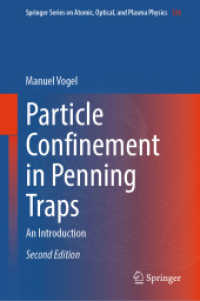Full Description
The last few years have witnessed exponential growth in research output within the field of language aptitude. With contributions from an international team of leading experts, this volume provides the most comprehensive, authoritative and up-to-date overview of developments in language aptitude theory and practice. It addresses central and newly emerging methodological and theoretical issues, and revisits and re-examines the most popular language aptitude tests, including the most durable and innovative batteries. It also provides in-depth demonstrations of language aptitude research paradigms, including well-established and emerging ones, scrutinizing them from multidisciplinary perspectives. Aptitude treatment interactions studies are reported and discussed, and pedagogical implications are provided, to illuminate theory construction, test development, policymaking, curriculum design and classroom practice. Seamlessly integrating theory, research, assessment and practice, it is essential reading for anyone seeking to learn more about language learning, training and teaching, and will further advance the research in this exciting, fast-paced field.
Contents
Preface and acknowledgements; 1. Language aptitude research: from testing to theory and practice Zhisheng Wen, Peter Skehan and Richard Sparks; Part I. Revisiting and Refining Aptitude Tests: 2. The MLAT-Elementary: history, adaptations and current uses Daniel Reed and Charles Stansfield; 3. Testing language aptitude: LLAMA evolution and refinement Vivienne Rogers, Paul Meara and Brian Rogers; 4. The High-Level Language Aptitude Test Battery (Hi-LAB): development, validation and use Meredith Hughes, Ewa Golonka, Alison Tseng and Susan Campbell; 5. Exploring the predictive validity of the LLAMA language aptitude tests: a research synthesis Lars Bokander; Part II. Aptitude Testing of Diverse Groups: 6. Testing language aptitude for Chinese learners of foreign languages: FLAT-C vs. LLAMA Zhao Haiyong, Luo Shaoqian and Fu Ailan; 7. Testing language aptitude for recently arrived parent-child immigrant dyads Amelia Lambelet; 8. Is language aptitude immune to experience? Divergent evidence from bilingualism vs. blindness Niclas Abrahamsson and Helena Smeds; 9. Testing language aptitude: reanalysis of batteries and constructs Peter Skehan; Part III. Innovative Perspectives and Paradigms: 10. The neurobiology of language aptitude, musicality and working memory Sabrina Turker and Susanne Reiterer, 11. The Linguistic Coding Differences Hypothesis (LCDH) and L2 learning: a thirty-year retrospective Richard Sparks; 12. Variability of language aptitude and working memory in EFL learners' listening development Pengyun Chang and Lawrence Jun Zhang; 13. An aptitude model for translation and interpreting: insights from translanguaging theory Lili Han, Zhisheng (Edward) Wen, Zi-yu Lin and Wei Li; Part IV. Aptitude Treatment Interactions (ATI): 14. Language aptitude and timing of form-focused instruction in TBLT Gabriel Michaud and Ahlem Ammar; 15. Implicit (not explicit) learning aptitude predicts the acquisition of difficult (not easy) structure: a visual-world eye-tracking study Yuichi Suzuki, Robert DeKeyser and Yi Ting Huang; 16. Implicit/statistical learning and second language outcomes: a Bayesian meta-analysis Daniel Jackson and Ryo Maie; Part V. Final Commentaries: 17. Reflections on language aptitude: theory, research and measurement Peter Skehan; 18. Epilogue: the nature and measurement of language aptitude - what are the important questions? Michael Bunting; Index.






